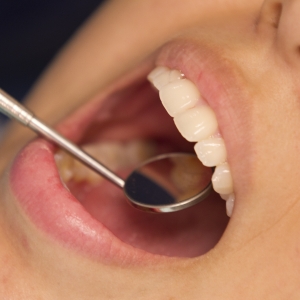
Study Highlights:
- Losing two or more teeth during middle age is associated with increased cardiovascular disease risk.
- Having fewer natural teeth by middle age is linked to higher cardiovascular disease risk.
Embargoed until 3 p.m. Central Time/4 p.m. Eastern Time, Wednesday, March 21, 2018
NEW ORLEANS, March 21, 2018 — Losing two or more teeth in middle age is associated with increased cardiovascular disease risk, according to preliminary research presented at the American Heart Association’s Epidemiology and Prevention | Lifestyle and Cardiometabolic Health Scientific Sessions 2018, a premier global exchange of the latest advances in population based cardiovascular science for researchers and clinicians.
Studies have shown that dental health problems, such as periodontal disease and tooth loss, are related to inflammation, diabetes, smoking and consuming less healthy diets, according to study author Lu Qi, M.D., Ph.D., professor of epidemiology at Tulane University in New Orleans.
“Previous research has also found that dental health issues are associated with elevated risk of cardiovascular disease,” Qi said. “However, most of that research looked at cumulative tooth loss over a lifetime, which often includes teeth lost in childhood due to cavities, trauma and orthodontics. Tooth loss in middle age is more likely related to inflammation, but it hasn’t been clear how this later-in-life tooth loss might influence cardiovascular disease risk.”
In a collaborative research effort between Tulane University School of Public Health and Tropical Medicine and Harvard T.H. Chan School of Public Health, Qi and colleagues analyzed the impact of tooth loss in large studies of adults, aged 45 to 69 years, in which participants had reported on the numbers of natural teeth they had, then in a follow-up questionnaire, reported recent tooth loss. Adults in this analysis didn’t have cardiovascular disease when the studies began. The researchers prospectively studied the occurrence of tooth loss during an eight-year period and followed an incidence of cardiovascular disease among people with no tooth loss, one tooth lost and two or more teeth lost over 12-18 years.
They found:
-
Among the adults with 25 to 32 natural teeth at the study’s start, those who lost two or more teeth had a 23 percent increased risk of cardiovascular disease, compared to those with no tooth loss.
-
The increased risk occurred regardless of reported diet quality, physical activity, body weight and other cardiovascular risk factors, such as high blood pressure, high cholesterol and diabetes.
-
There wasn’t a notable increase in cardiovascular disease risk among those who reported losing one tooth during the study period.
-
Cardiovascular disease risk among all the participants (regardless of the number of natural teeth at the study’s start) increased 16 percent among those losing two or more teeth during the study period, compared to those who didn’t lose any teeth.
-
Adults with less than 17 natural teeth, versus 25 to 32, at the study’s start, were 25 percent more likely to have cardiovascular disease.
“In addition to other established associations between dental health and risk of disease, our findings suggest that middle-aged adults who have lost two or more teeth in recent past could be at increased risk for cardiovascular disease,” Qi said. “That’s regardless of the number of natural teeth a person has as a middle-aged adult, or whether they have traditional risk factors for cardiovascular disease, such as poor diet or high blood pressure.”
Armed with the knowledge that tooth loss in middle age can signal elevated cardiovascular disease risk, adults can take steps to reduce the increased risk early on, he said.
A limitation of the study was that participants self-reported tooth loss, which could lead to misclassification in the study, according to Qi.
Co-authors are: Yoriko Heianza, R.D., Ph.D.; Dianjianyi Sun, M.D, Ph.D.; Eric B. Rimm, Sc.D.; Kaumudi J. Joshipura, B.S.D., M.S., Sc.D.; and JoAnn E. Manson, M.D., Dr.PH. Author disclosures are on the abstract.
Additional Resources:
Statements and conclusions of study authors that are presented at American Heart Association scientific meetings are solely those of the study authors and do not necessarily reflect association policy or position. The association makes no representation or warranty as to their accuracy or reliability. The association receives funding primarily from individuals; foundations and corporations (including pharmaceutical, device manufacturers and other companies) also make donations and fund specific association programs and events. The association has strict policies to prevent these relationships from influencing the science content. Revenues from pharmaceutical and device corporations are available at http://www.heart.org/corporatefunding.
###
About the American Heart Association
The American Heart Association is devoted to saving people from heart disease and stroke – the two leading causes of death in the world. We team with millions of volunteers to fund innovative research, fight for stronger public health policies and provide lifesaving tools and information to prevent and treat these diseases. The Dallas-based association is the nation’s oldest and largest voluntary organization dedicated to fighting heart disease and stroke. To learn more or to get involved, call 1-800-AHA-USA1, visit heart.org or call any of our offices around the country. Follow us on Facebook and Twitter.
For Media Inquiries and AHA Spokesperson Perspective: 214-706-1173
Darcy Spitz; 212-878-5940; darcy.spitz@heart.org or Carrie Thacker; 214-706-1665; c.thacker@heart.org
For Public Inquiries: 800-AHA-USA1 (242-8721)






Leave a Reply